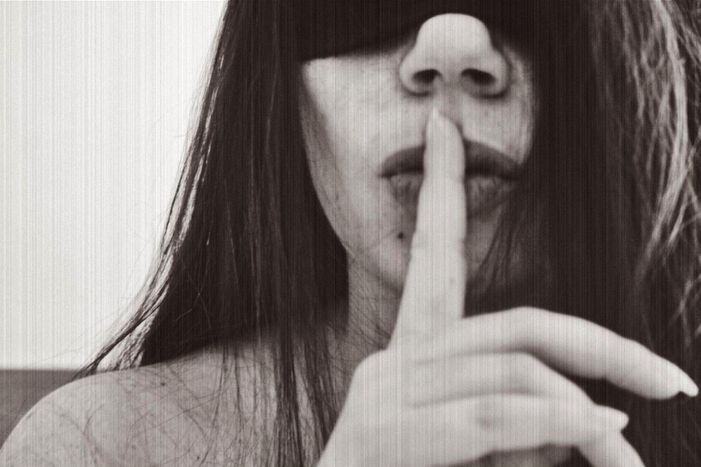
Denmark's multicultural silence from prophets to terrorists
Published on
Translation by:
 hkeet
hkeet
Denmark is traumatised. The Danish have regretted their negative image since the publication of the Mohammed caricatures, which pushed the small Scandinavian country into the world spotlight in 2005. Since then they've been keeping quiet. Goodbye freedom of opinion?
The planned enactment of an anti-islamist Norwegian terrorist's manifesto in Copenhagen reopens the question of the multicultural debate
The response from Danish daily newspaper JyllandsPosten lands in my inbox with a curt response to my query: 'Dear colleague, thank you for your email. Sorry, but we have completely ceased to make comments about the Mohammed-thing. Best regards, Tage Clausen, spokesman.' Who doesn't remember the publication of the Mohammed caricatures from 2005, which caused a sensation worldwide? They pushed Denmark into the spotlight for the first time ever in terms of freedom of press, and provoked muslim minorities in Europe and across the world (depictions of the prophet, believed to be the last prophet in islam, are blasphemous according to the religion - ed). Seven years later, Copenhagen would rather keep quiet on the subject. It seems trite to open up the affair again and again. Flemming Rose, the head of the culture section at Jyllands-Posten who approved the publication of the 12 caricatures (only some featured the prophet - ed), has published the book The Tyranny of Silence (2010), to put an end to the subject. Full stop.
No comment
The glass door closes behind me. A code is typed in on the other side. Only then does the second glass door open in front of my face. Tarek Omar waves me through the security checkpoint. Politiken, the daily newspaper where the editor works, is in the same building on Rådhuspladsen in Copenhagen as the Jyllands-Posten offices. The editorial department has been more secure than any bank for several years - it is under surveillance day and night. 'Were the cartoons really worth going through this every day?' he asks. 'My child is one years old; I needed an extra badge when I brought my baby to the editorial department for the first time.' Nevertheless, the 34-year old doesn't understand why nobody at Jyllands-Posten wants to give out information on freedom of press. 'It's our job!'
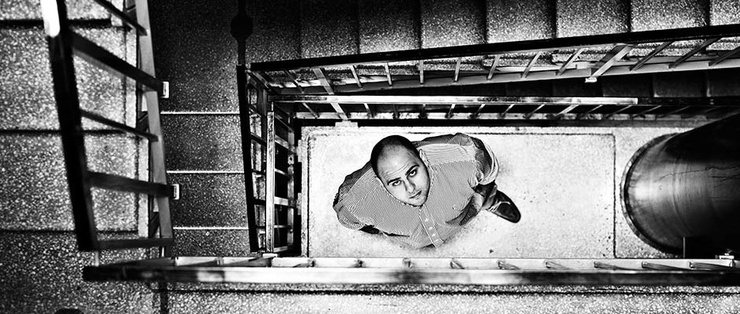
The dividing line between freedom of opinion and the violation of religious beliefs has become flimsy in Europe. This can be seen not only by the recent attack on the satirical newspaper Charlie Hebdo in France, but also in the increasing tendency to censor criticism towards islam in general. In a 2010 study by Kaas & Mulvad, half of the 654 members of cultural organisations in Denmark wished to remain anonymous. Almost 50% surveyed thought that freedom of opinion was in danger in Denmark. Is it taboo to make mocking islam, just like other religions, the subject of discussion in Denmark? 'I do think editors contemplate who they are provoking today,' said an editorial intern. Even she asks to remain anonymous.
MuhameDaneren vs. Danish people's party
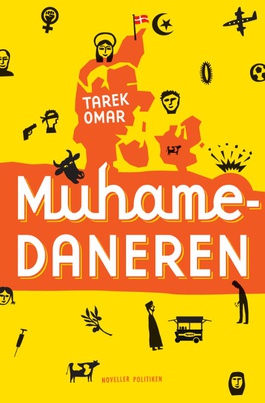 Tarek Omar comes from Lebanon, even if he doesn't like to be defined by his ethnic origin. 'I see myself as a Dane, an Arab, but above all as a father,' says the former Brussels correspondent in accent-free English. In 2011, the 34-year old published a book called MuhameDaneren. Omar's characters - the 'new Danes' - get lost in their identities. Yet he says that there was never any aggravation. Even the porn-addicted imam character who features in one of the stories was accepted in religious circles. Is it because he's a muslim himself? 'No, they recognised the beauty,' says Omar. 'Flags don't have to be burnt all the time. It depends on the mind-set. If it's pure provocation, then it’s meaningless.'
Tarek Omar comes from Lebanon, even if he doesn't like to be defined by his ethnic origin. 'I see myself as a Dane, an Arab, but above all as a father,' says the former Brussels correspondent in accent-free English. In 2011, the 34-year old published a book called MuhameDaneren. Omar's characters - the 'new Danes' - get lost in their identities. Yet he says that there was never any aggravation. Even the porn-addicted imam character who features in one of the stories was accepted in religious circles. Is it because he's a muslim himself? 'No, they recognised the beauty,' says Omar. 'Flags don't have to be burnt all the time. It depends on the mind-set. If it's pure provocation, then it’s meaningless.'
What Omar calls provocation, Helle Merete Brix describes as freedom of opinion pure and simple. Multicultural success stories are too easy to tell, the journalist says. She has a 'clear profile' in Denmark, she cautions us. People often label her as an islamophobe. Are they right in doing so? The Jyllands-Posten caricature by Kurt Westergaard which caused a sensation around the world seven years ago hangs in Brix' apartment next to buddhist images. Brix herself is a buddhist, although she says she believes in a 'European dominant culture' which is based on the values of christianity, on strong border controls and on the incompatibility of islam and democracy. The author worked for years on Against the Darkness: the Muslim Brotherhood in Europe ('Mod Mørket: Det Muslimske Broderskab i Europa') for the Danish free press society. However this cooperation ended after a difference in opinions. 'It's like a marriage; sometimes people get divorced.'
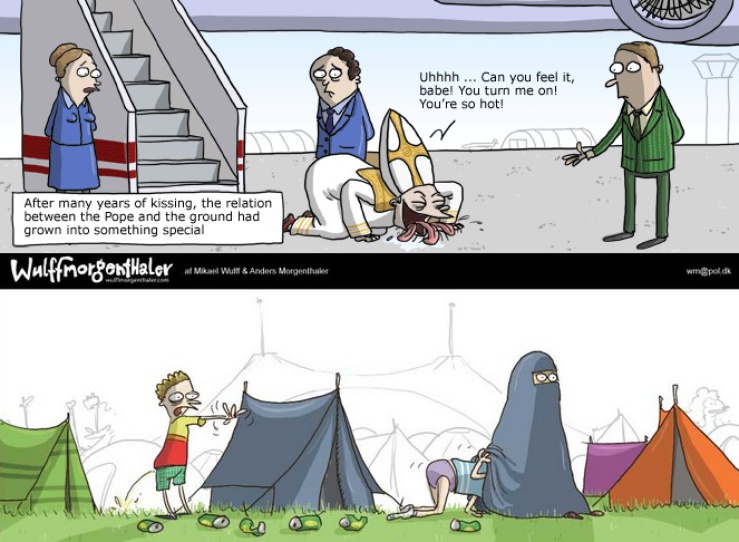
Brix believes that the right-wing populists of the Danish people's party, who have gradually poured general uncertainty into restrictive legal texts against foreigners since 9/11, are a necessary voice against the growing influence of islam. In the last decade, Danish right-wing liberals have always made concessions in terms of immigration in their alliance with right-wing populists. According to Brix, no other politicians have the guts to tackle this topic in public. Instrumentalising freedom of opinion on the part of the right-wing populists has also long found its way into Denmark.
Anders Breivik and christian terror
In CaféTeatret in Copenhagen we trace a red line on the ground with Denmark's currently most controversial theatre director and playwright, Christian Lollike. It leads through chaotic back rooms, rows of chairs, up and down sets of stairs or to the basement of the performance theatre. This is the theatre path through the curious building that the audience will later take, too. At the moment, the enfant terrible of Danish theatre is on everyone's lips. Lollike wants to enact the Oslo terrorist Anders Breivik's manifesto 2083 – A European Declaration of Independence. In 2011, Breivik killed 77 people, many of whom were teenagers, during his rampage on the Norwegian island of Utøya. 'In Scandinavia we have legitimised a particular tone which we use to speak about foreigners, and muslims in particular. It is often a racist tone, which can also lead to extremism like this,' he says.
In Scandinavia we have legitimised a particular, racist tone which we use to speak about foreigners
According to Lollike, it is a fact that the islam debate has subsided since the publication of the Mohammed caricatures. However he doesn't want to sweep the cruelty of the avowing christian under the carpet. The events in Utøya and the manifesto, which will always circulate the internet, should not be left uncommented. The right-wing populists try to muzzle the director time after time; they stigmatise him for his lack of empathy. His project doesn't fit in with the typical enemy stereotype. Respecting freedom of opinion, which was demanded for the Jyllands-Posten caricatures, has suddenly become minor for politicians and the public in this case.
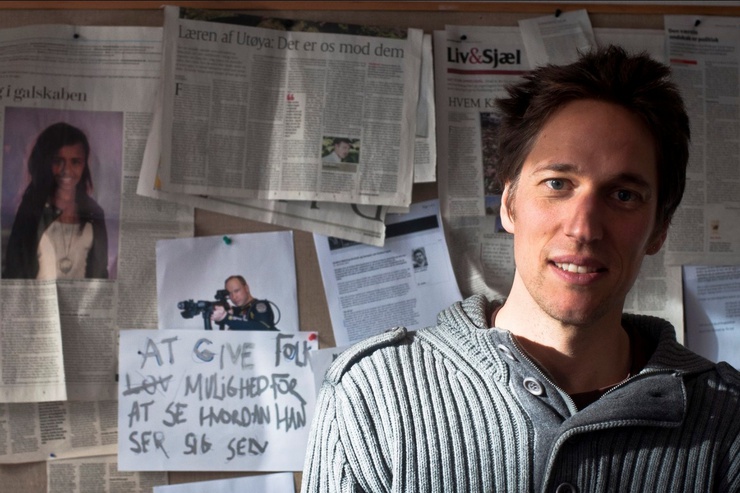
'Can you see what is written on Breivik's upper arm, when you look closely?' Lollike asks, pointing to a photo, which is hanging on his pinboard full of snippets and newspaper articles for the theatre piece. 'Multicultural traitor hunting permit'. He says that all of these evil thoughts about muslims make him really sick. Lollike was affected deeply by the media circus around the planned enactment. In particular when Danish television, despite prior arrangement, confronted the parents of the victims. But the notorious troublemaker won't get distracted so easily. In defence of his project he says that it could happen again. 'We have a responsibility towards the muslim members of our population. When al-Qaida attacks the Twin Towers, it's part of a religious and cultural war. But when it concerns a sick and crazy person like Anders Breivik, then it has nothing to do with our society. This difference is hypocritical and a threat to our democracy.'
This article is part of the third edition in cafebabel.com’s 2012 feature focus series on multiculturalism in Europe. Many thanks to Ulrik Troille Smed and the team atcafebabel Copenhagen
Images: main (cc)FotoRita/ flickr; Tarek Omar © tarekomar.dk; caricatures © Wulffmorgenthaler; Christian Lollike © Nicola Zolin for 'MultiKulti' aka 'Multiculturalism on the ground' by cafebabel.com, February 2012
Translated from Von Mohammed zu Anders Breivik: Das Schweigen der Dänen


